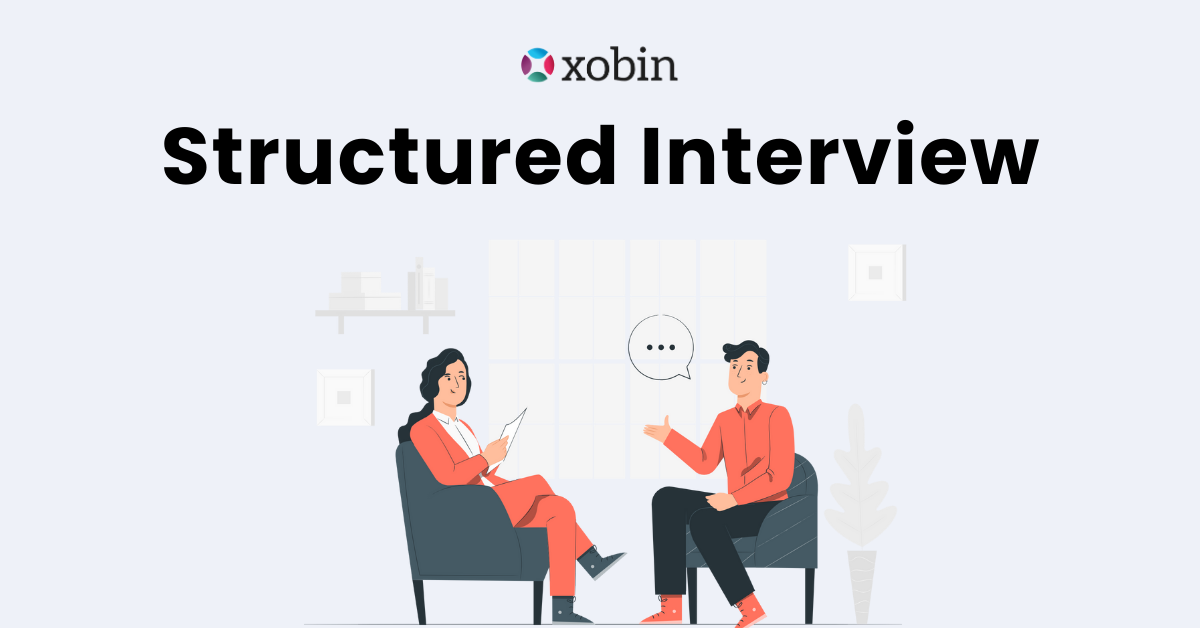XOBIPEDIA
HR Glossary

Table of Contents
A structured interview is a standardized interview method designed to reduce bias, improve hiring accuracy, and ensure fair candidate evaluation. In an era where unstructured interviews often lead to inconsistent decisions and costly mis-hires, structured interviews help HR leaders make data-driven, defensible hiring decisions while delivering a consistent candidate experience across roles and geographies.
TL;DR
- A structured interview uses predefined questions, scoring rubrics, and evaluation criteria for every candidate.
- It significantly improves hiring accuracy, fairness, and legal defensibility.
- Structured interviews outperform unstructured interviews in predicting job performance.
- Ideal for high-volume hiring, skills-based recruitment, and diversity-focused hiring.
- Works best when combined with pre-employment assessment tools.
What Is a Structured Interview?
A structured interview is a standardized interview process where every candidate is asked the same set of job-related questions in the same order. Their responses are then evaluated using a predefined scoring system.
From an HR perspective, structured interviews bring discipline and repeatability to talent evaluation. Each question is mapped to specific competencies such as problem-solving, communication, or leadership and interviewers score responses using predefined rubrics rather than gut instinct. As a result, decisions are based on evidence, not impressions.
Moreover, structured interviews align closely with competency-based hiring models, making them especially valuable for organizations hiring at scale or operating in regulated industries. They ensure that every candidate is assessed fairly, regardless of who conducts the interview or when it takes place.

Why Structured Interviews Matter in Modern Hiring
Unstructured interviews feel natural, but they’re risky. Research in industrial-organizational psychology consistently shows that unstructured interviews have low predictive validity and high interviewer bias. This directly impacts hiring quality, diversity outcomes, and employer credibility.
Structured interviews matter because they:
- Improve hiring accuracy: Studies show structured interviews are nearly twice as predictive of job performance compared to unstructured ones.
- Reduce unconscious bias: Standardized questions and scoring minimize the halo effect, similarity bias, and recency bias.
- Enhance fairness and DEI: Every candidate competes on the same criteria, supporting inclusive hiring goals.
- Increase legal defensibility: Documented scoring and job-related questions reduce compliance risk.
According to multiple hiring studies, structured interviews are among the most reliable predictors of job performance. In other words, they don’t just feel fair. They actually work.
💡 Pro Tip: Pair structured interviews with pre-employment skill assessments to validate both capability and behavior before final decisions.
Key Components of a Structured Interview
Standardized Interview Questions
Every structured interview begins with carefully designed questions linked directly to job competencies. These may include behavioral questions (“Tell me about a time…”) or situational questions (“What would you do if…”). The key is consistency; each candidate answers the same questions.
Predefined Scoring Rubrics
Each response is evaluated using a numeric or descriptive rating scale. Interviewers score answers based on clear benchmarks of what “excellent,” “average,” or “poor” looks like. This prevents subjective interpretation.
Interviewer Training
Structured interviews only work when interviewers are trained to follow the framework. Training ensures they ask questions neutrally, probe consistently, and score objectively.
Documentation & Feedback
Responses and scores are documented systematically. This creates an audit trail and allows hiring panels to compare candidates objectively rather than relying on memory or opinion.
Structured Interview vs. Unstructured Interview
| Aspect | Structured Interview | Unstructured Interview |
| Questions | Predefined and standardized | Random, conversational |
| Scoring | Objective, rubric-based | Subjective impressions |
| Bias Risk | Low | High |
| Predictive Accuracy | High | Low |
| Legal Defensibility | Strong | Weak |
| Scalability | Excellent | Poor |
While unstructured interviews feel flexible, they often sacrifice accuracy. On the other hand, structured interviews balance fairness with relevance, making them ideal for modern recruitment.
Types of Structured Interview Questions
Behavioral Questions (STAR Method)
These questions focus on past behavior as a predictor of future performance. Candidates describe real situations, actions taken, and outcomes achieved.
Situational Questions
Candidates are presented with hypothetical job-related scenarios. Their responses reveal judgment, decision-making, and problem-solving ability.
Competency-Based Questions
Each question maps directly to a required competency, such as teamwork, adaptability, or leadership. This ensures alignment with role expectations.
When Should Organizations Use Structured Interviews?
Structured interviews are especially effective when:
- Hiring for high-impact or leadership roles
- Conducting high-volume recruitment
- Building fair and inclusive hiring practices
- Hiring across multiple interviewers or locations
- Needing audit-ready, compliant hiring processes
- Running remote or virtual interviews
- Combining interviews with online skills assessment platforms
For global organizations and fast-growing companies, structured interviews ensure consistency without slowing down hiring velocity.
How Structured Interviews Work Best with Assessments
Here’s the truth. Interviews alone don’t tell the full story.
When you pair structured interviews with pre-employment testing, magic happens. Assessments validate skills objectively, while interviews explore behavior and thinking patterns.
This combination leads to smarter hiring decisions and long-term employee success. That’s exactly where platforms like Xobin step in.
At Xobin, we help you go one step further. Our talent assessment platform seamlessly integrates structured interviews with skills-based testing, so you hire with confidence, not guesswork.
Ready to improve hiring accuracy and reduce bias? Book a personalized demo with Xobin today and build a smarter, fairer hiring process.
FAQs
1. Are structured interviews better than unstructured interviews?
Yes. Structured interviews are proven to be more reliable, fair, and predictive of job performance than unstructured interviews.
2. Do structured interviews reduce candidate experience?
No. When designed well, they actually improve candidate experience by making the process transparent and fair.
3. Can structured interviews be used for senior leadership roles?
Absolutely. Many organizations use competency-based structured interviews for executive and leadership hiring.
4. How many questions should a structured interview have?
Typically 6–10 well-designed questions are sufficient to evaluate key competencies without overwhelming candidates.
5. Can structured interviews be conducted virtually?
Yes. Structured interviews work extremely well in video or AI-assisted interview formats, ensuring consistency across remote hiring.
6. Do structured interviews eliminate bias completely?
They don’t eliminate bias entirely, but they significantly reduce it compared to informal interview methods.

Recommended Content

Video Interviews can simplify your hiring
Don’t let a packed schedule be a hindrance in recruitment. Use structured interviews with the power of video to screen applicants. Understand the communication skills, motivation, and job skills using video interviews.

Pre-employment Testing: The Complete Guide
Move over from pen-paper based tests and manually checked assignments to pre-employment assessments. Democratize your organization hiring by screening for skills before you interview.

How can Employers adapt to Remote Hiring
With most jobs going remote, your best applicants could be in Melbourne or Miami. From remote screening and virtual interviews to remote onboarding, Learn the best practices to get started.


